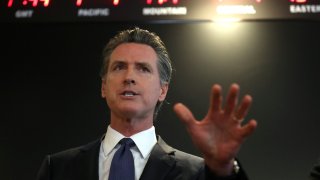
FILE: California Gov. Gavin Newsom speaks during a news conference at the California Department of Public Health on February 27, 2020 in Sacramento, California.
UCLA should publicly explain why one of the mainstays of the Pac-12 Conference is bolting for the Big Ten Conference to compete against schools primarily located in the Midwest, Gov. Gavin Newsom said Wednesday.
Newsom, who has been vocal about his disdain for the conference shakeup, doubled down on his criticism of the move Wednesday when he attended a UC Board of Regents closed-door meeting in San Francisco. The governor demanded a public explanation from the school about its reasoning and how the move will benefit student-athletes.
"UCLA must clearly explain to the public how this deal will improve the experience for all its student-athletes, will honor its century-old partnership with UC Berkeley and will preserve the histories, rivalries and traditions that enrich our communities," he said in a statement issued to the Los Angeles Times.
UCLA and UC Berkeley have played each other in football since 1923.
Get Southern California news, weather forecasts and entertainment stories to your inbox. Sign up for NBC LA newsletters.
The Bruins and rival USC will move to the Big Ten in 2024. Their departures will mark a major financial hit for the Pac-12 Conference's remaining teams, including Berkeley, the lone UC school that will be left in the conference.
But UCLA and USC will likely see a major boost in revenue, primarily from media-rights deals in the Big Ten. Historically a Midwestern conference, the Big Ten will become a coast-to-coast conference boasting some of the country's most powerful athletic programs.
When the move was announced, UCLA officials noted that the financial boost from the Big Ten will allow the university to maintain all of its athletic programs, some of which were believed to be in financial jeopardy absent a major influx of cash. The university also noted a major benefit for student-athletes, likely allowing them to obtain more lucrative name, image and likeness deals.
"Additionally, it means enhanced resources for all of our teams, from academic support to mental health and wellness," UCLA Chancellor Gene Block and Athletics Director Martin Jarmond said in a statement announcing the move last month. "And although this move increases travel distances for teams, the resources offered by Big Ten membership may allow for more efficient transportation options. We would also explore scheduling accommodations with the Big Ten that best support our student-athletes' academic pursuits."
USC President Carol L. Folt issued a statement of her own.
"With the Big Ten, we are joining a storied conference that shares our commitment to academic excellence and athletic competitiveness, and we are positioning USC and our student-athletes for long-term success and stability amidst the rapidly evolving sports media and collegiate athletics landscapes. We are delighted to begin this new chapter in 2024"
The UC Board of Regents cannot force UCLA to reverse the decision because in 1991 campus chancellors were delegated authority by the UC Office of the President to execute their own contracts, including intercollegiate athletic agreements. The regents though could require UCLA pay an exit fee to Berkeley or a share TV revenues from a move to the Big Ten.